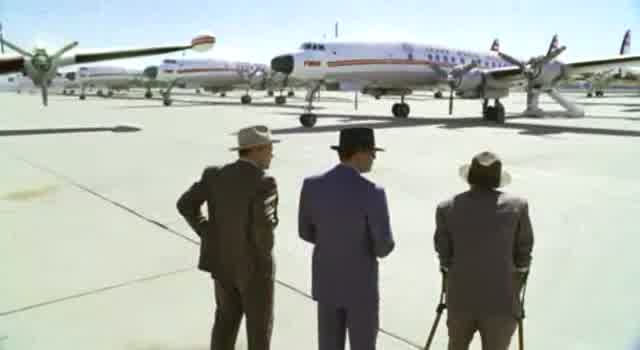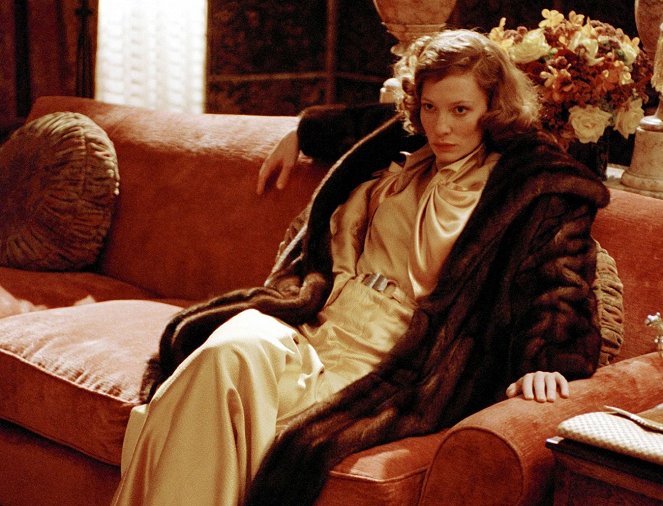Directed by:
Martin ScorseseScreenplay:
John LoganCinematography:
Robert RichardsonComposer:
Howard ShoreCast:
Leonardo DiCaprio, Cate Blanchett, Kate Beckinsale, John C. Reilly, Alec Baldwin, Alan Alda, Ian Holm, Danny Huston, Gwen Stefani, Jude Law, Adam Scott (more)VOD (2)
Plots(1)
Howard Hughes was a wily industrialist, glamorous movie producer and unstoppable American innovator – but thought of himself first and foremost as an aviator. In this spectacular epic, director Martin Scorsese focuses on the most prolific period in the life of Hughes: the mid-1920s through the 1940s. It was a time of brilliant aeronautical invention, turbulent love affairs and savage corporate battles. Prepare yourself for the ride of a visionary lifetime. (Miramax Films)
(more)Videos (3)
Reviews (11)
If The Aviator is anything to go by, it's a perfect example of top Hollywood, the Hollywood that Hughes helped build in the 1920s with his bold visions. It's a precisely-fulfilled genre scheme that offers both a breathtaking spectacle and great dramatic filmmaking. You can't help but praise the famous camera, the well-incorporated tricks, and the perfect period music that gives everything style and atmosphere. The story of Howard Hughes is not only a personal drama, but also a spectacular and epic spectacle in which some scenes bolt you to your seat in a "Hollywood" manner and don't let you breathe (the superbly shot aerial sequences are really worth it). More importantly, each part serves a monumental whole, and the monumentality of the whole does not overshadow the personal and not-very-idealized personal plane. Hughes' personality is the centerpiece around which everything spectacularly turns, not the other way around. That's what I appreciate about Martin Scorsese. He didn't succumb to a big topic and tried to go under the surface. He did not idealize, but he tried to tell the story of one of the fascinating carriers of human imagination and the desire to fly (figuratively and literally) in all shades. From where I was sitting, it clearly seemed that he had succeeded. The Aviator is a truly wonderful specimen of a biographical major film in all its dazzling sheen. There's no room for misery this time... The few extra minutes the film has can be considered a hereditary disease. And Scorsese was able to richly balance Logan's weaker script with his precise direction.
()
This is the second time I have seen this Scorsese film, as I couldn't endure it all the way to the end the first time due to its length and my lack of interest, and I was missing about 40 minutes to settle the score with The Aviator. I was able to erase it from my memory practically perfectly in record time, and that already proves that this time Martin and I didn't see eye to eye. Honestly, it's probably the film I most could not get into from this famous American filmmaker in the last two decades. While his recent films managed to impress me, The Aviator only bored and disinterested me. Despite being undoubtedly a blockbuster with everything that belongs to it - a multitude of stars, a high budget, a script overflowing with ambition, and a charismatic hero - something doesn't work in it, and it's not just because the theme didn't appeal to me. Scorsese describes his hero in a way that is very different from the reality that could resemble how Costa Gavras settles accounts with capitalism in his film Capital. The real Howard Hughes was such a scoundrel that even Belfort, the main character of The Wolf of Wall Street could be considered a good buddy from Sunday school and Mother Teresa's secretary. Even an American like Leacock noticed the typical characteristic of Americans - admiring successful people regardless of how they came to wealth and how they handled it and made fun of it in his book "Literary Lapses." In the United States, Howard Hughes is considered a legend, even though his real behavior, actions, and impacts were very problematic. In the movie, there is one scene where Howard is visiting Katharine Hepburn's family, which represents that typical inward-looking snobbish liberal society that drowns in wealth while prattling about socialism. When the lady of the house says that they never talk about money in their house, Howard responds, "That's because you have plenty of it." Howard Hughes was the last person who could pass any judgments. He inherited the money and then enjoyed it and lived the typical life of a playboy and celebrity. He treated his employees thoughtlessly, manipulated, blackmailed and lobbied in the worst imaginable way, which meant nothing other than mass corruption. Even his illness is highly debatable; in the 1940s, he certainly didn't suffer from any mental illness, and, typically, he was able to manage his companies so skillfully until the end of his life that he never paid a penny in taxes while being one of the five richest people on this planet. I'll give it three stars thanks to several great scenes, such as the crash of the airplane and its impressive flight through a residential area, where Scorsese presents himself in the best possible form. But it's just barely three stars... Overall impression: 50%.
()
A stunning cinematic work by a true artist, both in image and acting. I wasn't bored even for a minute, the runtime was okay, I actually wouldn't have minded a bit more. And the emotional impact on me was all the greater because I have dealt with obsessive compulsive disorder in my life, so I know exactly what Scorsese was talking about, and that he didn't miss the mark is evidenced by the feelings of one of my friends, also OCD, who was shocked to find himself in the character of Howard Hughes. So, thank you Sir.
()
The pilot is not bad at all, but after two screenings in one year, I can't imagine trying to go through it all again even fifteen years later. DiCaprio is great, but surprisingly, Scorsese can't maintain a good momentum, he gets lost in Hughes' psychoses, and the story that goes to flowers is only fixed in the thrilling courtroom finale.
()
One of those films for which Leo should have rather received an Oscar. It is his great performance, but it is not the only strong aspect of the film. Scorsese's direction is so confident that he dares to have an excessive running time because he knows it won't bore anyone. The last two hours captivated me so much that I couldn't tear myself away from the film - for the second time.
()



Ads